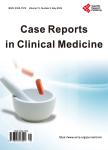Epidemiology and outcome of methicillin-resistant Staphylococcus aureus health-care associated pneumonia
Epidemiology and outcome of methicillin-resistant Staphylococcus aureus health-care associated pneumonia作者机构:Department of Internal Medicine Henry Ford Health System Detroit MI USA Department of Internal Medicine Hurley Medical Center Flint MI USA Division of Infectious Diseases Henry Ford Health System Detroit MI USA
出 版 物:《Case Reports in Clinical Medicine》 (临床医学病理报告(英文))
年 卷 期:2013年第2卷第1期
页 面:38-43页
学科分类:1002[医学-临床医学] 100201[医学-内科学(含:心血管病、血液病、呼吸系病、消化系病、内分泌与代谢病、肾病、风湿病、传染病)] 10[医学]
主 题:MRSA Healthcare-Acquired Pneumonia Epidemiology Outcome
摘 要:Objectives: Methicillin-resistant Staphylococcus aureus (MRSA) is an important cause of health-care-associated pneumonia (HCAP). HCAP confers high morbidity and mortality. In this study, we evaluated risk factors and clinical outomes of MRSA-HCAP. Methods: Between 08/2008 and 09/2010 we conducted a retrospective, singlecenter study. Seven hundred and eighty three patients with MRSA isolated from respiratory cultures were screened. The primary outcome was 28-day mortality. Results were computed using univariate and multiple logistic regression analysis. Results: The analysis included 63 patients (54.78%) with MRSA HCAP. The mean age (±SD) was 65.95 ± 15.4 years. Thirty seven (58.7%) were males. Fifty six (88.9%) had at least one associated comorbid medical condition. Forty two (66.7%) were treated with vancomycin, 4 (6.3%) with linezolid and the remaining 17 (27%) were switched between the two antimicrobials. Mean APACHE II (±SD) score was 18.8 (±7.3). Mortality rate was 28.6%. APACHE-II score, chronic obstructive pulmonary disease (COPD) and superinfection were found to be independent risk factors for 28-day mortality. Conclusions: MRSA is a significant etiology of HCAP which is more prevalent in the elderly. The associated mortality rate could be high and driven by several factors including APACHE II score and preexisting COPD.



